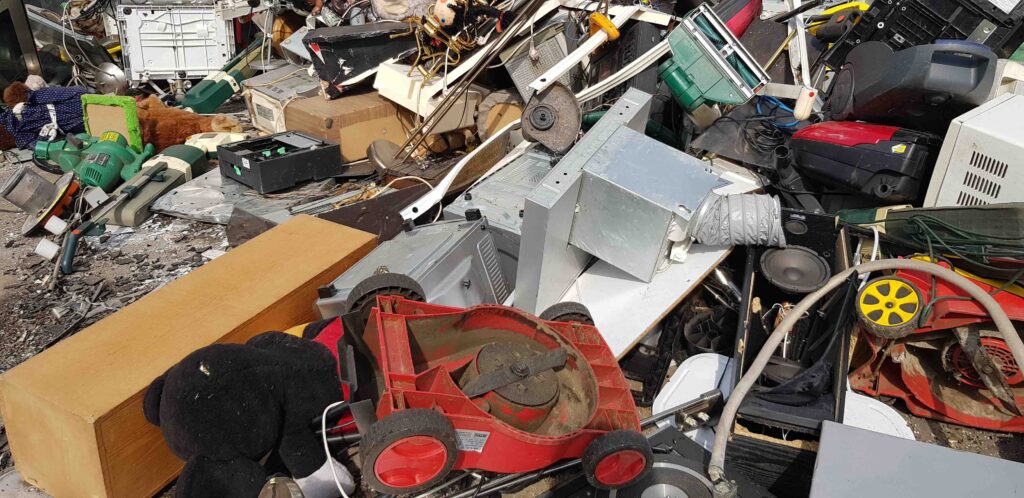World Resources Forum, Switzerland, CEWASTE Project / UN University
Led by the World Resources Forum, consortium designates recycling, reuse of key elements in four electronic, electrical product categories as ‘critical’
End-of-life circuit boards, certain magnets in disc drives and electric vehicles, EV and other special battery types, and fluorescent lamps are among several electrical and electronic products containing critical raw materials (CRMs), the recycling of which should be made law, says a new UN-backed report funded by the EU.

A mandatory, legal requirement to recycle and reuse CRMs in select e-waste categories is needed to safeguard from supply disruptions elements essential to manufacturers of important electrical and electronic and other products, says a European consortium behind the report, led by the Switzerland-based World Resources Forum.
The CEWASTE consortium warns that access to the CRMs in these products is vulnerable to geo-political tides. Recycling and reusing them is “crucial” to secure ongoing supplies for regional manufacturing of electrical and electronic equipment (EEE) essential for defence, renewable energy generation, LEDs and other green technologies, and to the competitiveness of European firms.
Today, recycling most of the products rich in CRMs is not commercially viable, with low and volatile CRM prices undermining efforts to improve European CRM recycling rates, which today are close to zero in most cases.
The report (available post-embargo at cewaste.eu) identifies gaps in standards and proposes an improved, fully tested certification scheme to collect, transport, process and recycle this waste, including tools to audit compliance.
“A European Union legal framework and certification scheme, coupled with broad financial measures will foster the investments needed to make recycling critical raw materials more commercially viable and Europe less reliant on outside supply sources,” says the consortium.
“Acceptance by the manufacturing and recycling industry is also needed, as the standards will only work when there is widespread adoption.”
The report follows the 2020 EU action plan to make Europe less dependent on third countries for CRMs by, for example, diversifying supply from both primary and secondary sources while improving resource efficiency and circularity.
Adds the consortium: “By adopting this report’s recommendations, the EU can be more self-sustaining, help drive the world’s green agenda and create new business opportunities at home.”
The project says the following equipment categories contain CRMs in concentrations high enough to facilitate recycling:
- Printed circuit boards from IT equipment, hard disc drives and optical disc drives
- Batteries from WEEE and end of life vehicles
- Neodymium iron boron magnets from hard disc drives, and electrical engines of e-bikes, scooters and end-of-life vehicles (ELVs)
- Fluorescent powders from cathode ray tubes (CRTs; in TVs and monitors) and fluorescent lamps
Recovery technologies and processes are well established for some CRMs, such as palladium from printed circuit boards or cobalt from lithium-ion batteries.
For other CRMs, ongoing recycling technology development will soon make industrial scale operations possible but needs financial support and sufficient volumes to achieve cost-efficient operations.
Of 60+ requirements in European e-waste-related legislation and standards, few address the collection of CRMs in the key product categories, the consortium found.
They propose several additional technical, managerial, environmental, social and traceability requirements for facilities that collect, transport, and treat waste, for integration into established standards, such as the EU 50625-series.
The overall scheme was tested at European firms in Belgium, Italy, Portugal, Spain and Switzerland, as well as in Colombia, Rwanda and Turkey.
“Greater CRM recycling is a society-wide responsibility and challenge,” says the consortium. “The relevant authorities must improve the economic framework conditions to make it economically viable.”
CEWASTE project recommendations include:
- Legislate a requirement to recycle specific critical raw materials in e-waste
- Use market incentives to spur the economic viability of recovering CRMs and to stimulate the use of recovered CRMs in new products
- Create platforms where demand for recycled components, materials and CRMs can meet supply
- Raise awareness of the importance of CRM recycling
- Consolidate fractions of CRM-rich products into quantities more attractive for recyclers
- Improve access to information on CRM-rich components and monitor actual recycling
- Enforce rules around shipment of CRM-rich fractions outside the EU and respect of technical standards along the value chain
- Integrate CEWASTE norms and requirements into the European standard for e-waste treatment (EN 50625 series) and make the whole set legally binding
- Support more targeted private investments in new technology research and development.
###
Media coverage highlights
The Guardian, United Kingdom
Insufficient recycling of rare metals could hinder climate efforts, experts warn https://www.theguardian.com/environment/2021/may/10/recycling-rare-metals-climate-green-technology
Agence France Presse, France
E-waste recycling matter of national security: report
https://news.yahoo.com/e-waste-recycling-matter-national-164642886.html
French: Le recyclage des e-déchets est un enjeu de sécurité nationale: rapport
https://yourtopia.fr/le-recyclage-des-e-dechets-est-un-enjeu-de-securite-nationale-rapport-france-24/
BBC, United Kingdom
Urgent calls for mandatory recycling of e-waste
https://www.bbc.co.uk/programmes/w3ct1lrz
TASS, Russia
Эксперты: переработку электронных отходов в ЕС должен регулировать специальный закон https://tass.ru/ekonomika/11334269
New Scientist, United Kingdom
The EU may make recycling e-waste a legal requirement – will it work?
https://www.newscientist.com/article/2277074-the-eu-may-make-recycling-e-waste-a-legal-requirement-will-it-work/
Yahoo! News, United States
Recycling tech ‘should be mandatory’ due to rare earth metals
https://news.yahoo.com/recycling-mandatory-155934304.html
Indo Asian News Service, India
Law Required For Recycling of EVs, Electric Equipment Having Critical Raw Materials: UN-Backed Report
https://www.news18.com/news/auto/law-required-for-recycling-of-evs-electric-equipment-having-critical-raw-materials-un-backed-report-3726527.html
Público, Spain
Residuos electrónicos Móviles, ordenadores y baterías contienen metales estratégicos para Europa que los expertos recomiendan recuperar
https://www.publico.es/ciencias/residuos-electronicos-moviles-ordenadores-baterias-contienen-metales-estrategicos-europa-hay-recuperar-avisan-expertos.html
HLN, Belgium
Experts vragen verplichte recyclage van zeldzame aardmetalen uit vrees voor tekorten https://www.hln.be/wetenschap-en-planeet/experts-vragen-verplichte-recyclage-van-zeldzame-aardmetalen-uit-vrees-voor-tekorten~a451065a/
Metals Recycling World, United Kingdom
Compulsory recycling urged for rare materials
https://www.mrw.co.uk/news/compulsory-recycling-urged-for-rare-materials-10-05-2021/
Tisen TV, Czech Republic
Recyklujte důležité kovy v elektronickém odpadu: Učiňte to zákonem, varují odborníci z Evropské unie a citují zabezpečení surovin
https://www.tisen.tv/recyklujte-dulezite-kovy-v-elektronickem-odpadu-ucinte-to-zakonem-varuji-odbornici-z-evropske-unie-a-cituji-zabezpeceni-surovin/
Kmetro, Italy
Rifiuti elettronici: Rapporto CEWASTE, il riciclaggio è una
https://kmetro0.it/2021/05/11/rifiuti-elettronici-rapporto-cewaste-il-riciclaggio-e-una-questione-di-sicurezza-nazionale/
Vietnam+, Viet Nam
Tái chế rác thải điện tử đóng vai trò quan trọng với an ninh châu Âu
https://www.vietnamplus.vn/tai-che-rac-thai-dien-tu-dong-vai-tro-quan-trong-voi-an-ninh-chau-au/711860.vnp
UrduPoint Network, Pakistan
E-waste Recycling Matter Of National Security: Report
https://www.urdupoint.com/en/world/e-waste-recycling-matter-of-national-security-1247456.html
Homeland Security News Wire, United States
Critical materialsE-Waste and National Security
http://www.homelandsecuritynewswire.com/dr20210510-ewaste-and-national-security
Newspapers in print
The Guardian (USA) 11 May 2021 Page: 13
News release in full, click here
Full coverage summary, click here